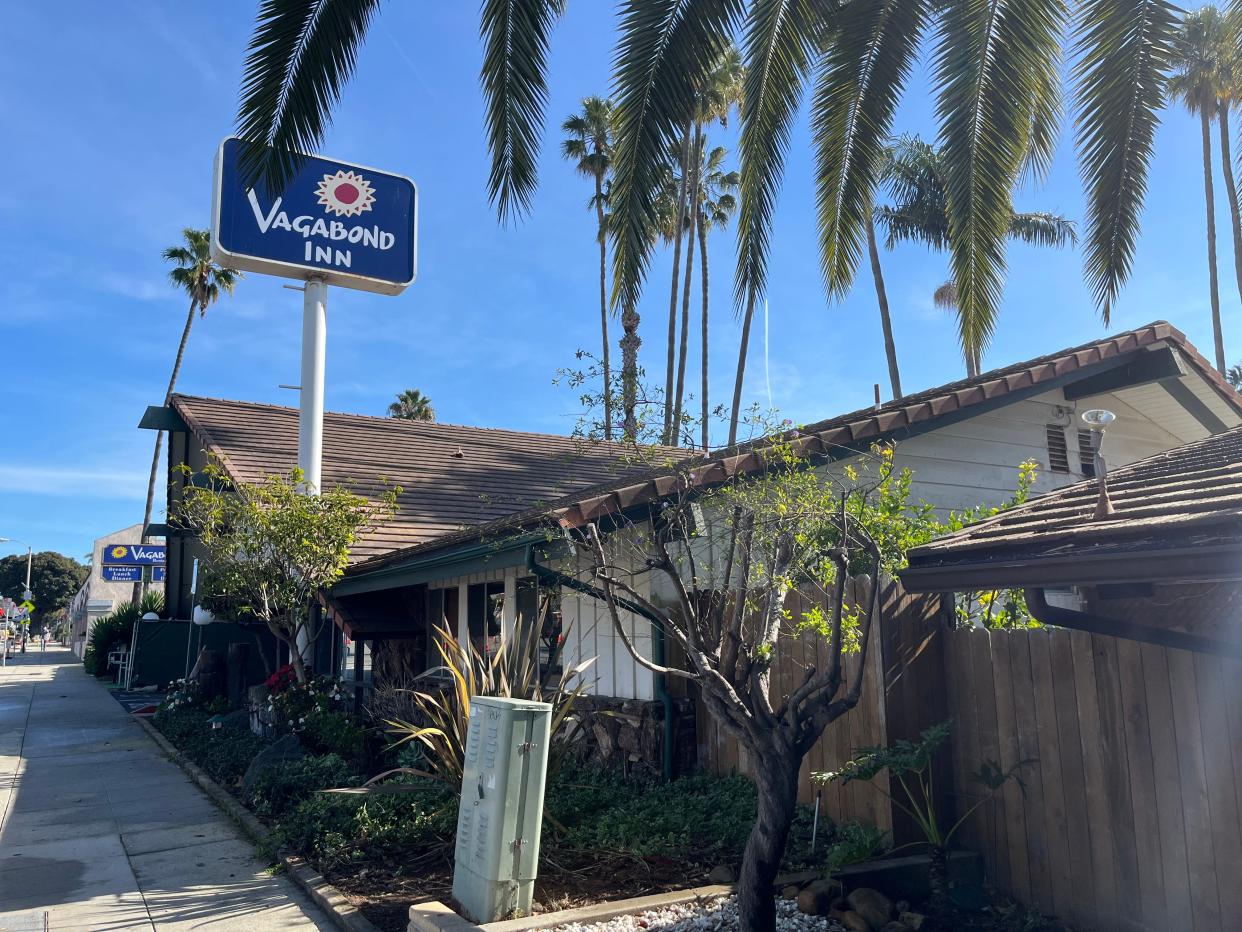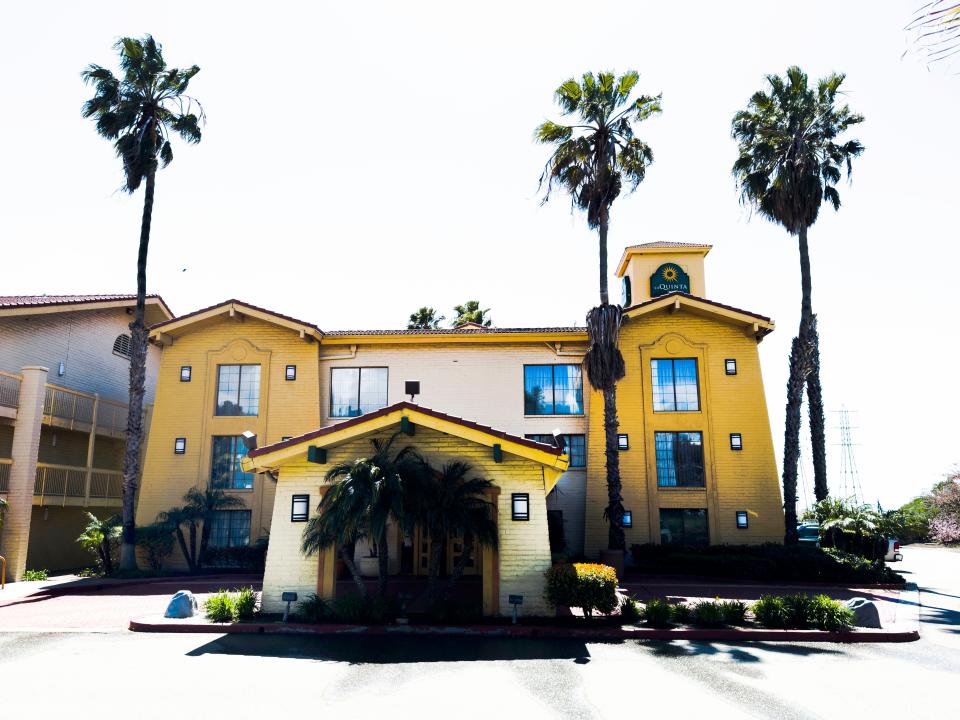Funds running out to keep homeless people in Ventura County motels

For the past 18 months or so, Gabriel Bates has been living at the Vagabond Inn in Ventura under Project Roomkey, a county-run, state-funded program that rents motel rooms for elderly, sick or disabled people who would otherwise be homeless.
“The program has been great,” he said. “I was able to get back on my feet. Once you have your home set up for you, you can actually progress and do better. I was able to get a car and start working part-time for Uber and other app jobs.”
A few weeks ago, he got a letter that said his voucher was expiring, and he’d have to be out by Jan. 10. The County of Ventura has a new state funding source for Project Roomkey, with stricter eligibility requirements for age and disability, and Bates was told he didn’t qualify. He is 46 and immunocompromised.
Bates ended up staying at the Vagabond Inn — in his words, he “fell through the cracks,” but his eligibility was restored when a public health worker provided the proper documentation for his disability. But 16 other residents of the Vagabond Inn and other motels in Ventura County did have to leave by Jan. 10, said Jenn Harkey, who oversees the county’s homelessness services as director of its Continuum of Care program.
That leaves 134 people still in Project Roomkey, living in 117 motel rooms in Ventura, Oxnard and Thousand Oaks. The clock is ticking for all of them. The new state grant that the county began using on Jan. 10 will run out around March 11, Harkey said.
She has identified another state grant that could fund the program for two months after that, and she’s hoping that by then, there will be new permanent housing available with the kind of services and support that most Project Roomkey residents need.
Racing the clock
Permanent housing for people with very low or no incomes, and who often need counseling and other services, is hard to come by. Most of the 16 people who left Project Roomkey were referred to group homeless shelters run by the Salvation Army or other nonprofit organizations. It’s likely that some of them ended up without shelter.
The best hope for available housing by the time the next grant runs out in May is another state program called Project Homekey. It provides funds to local governments and private developers to buy motel properties and convert them into housing, typically by fixing them up and putting kitchenettes in rooms that don’t have them.
There are three Project Homekey properties in Ventura County, but none of them are ready yet. One in Thousand Oaks is in limbo, with no expected completion date, because it’s owned by Shangri-La Industries, a developer that has stalled on that and six other Homekey projects and was recently sued by the state for alleged fraud and contract violations at all seven sites.
There are two more Homekey sites in the county, and both might have rooms available by the time Project Roomkey runs out of money in May.
One is the La Quinta Inn in Ventura. The Housing Authority of the City of San Buenaventura won a $32 million state grant to buy the property and turn it into 134 units of permanent supportive housing. The purchase is in escrow, but it can’t close until the state actually delivers the funds, and that probably won’t happen until March, said housing authority’s CEO Jeff Lambert.

“We had thought we’d be funded by now and closing escrow at the end of this month, but that’s how it works,” Lambert said. “It’s not an unusual delay.”
Lambert said the Housing Authority is working with the California Department of Housing and Community Development to get the money sooner. The Housing Authority could then do a very quick renovation of some of the rooms and lease them in a chunk to the county, which could sublease them to people leaving Project Roomkey.
The other hope for permanent supportive housing is at a former Vagabond Inn in Oxnard. The county won an $11 million Homekey grant for the property back in 2020, but it’s been used as a temporary homeless shelter ever since. A private developer and a nonprofit agency are now renovating it for permanent supportive housing, and Harkey said that project should be done in late spring.
Other types of low-cost units are in very short supply. The Ventura Housing Authority owns 1,050 affordable units and administers vouchers for another 1,300 privately owned units, Lambert said, and its wait lists for those apartments have more than 15,000 people on them.
'People who could die on the street'
Project Roomkey was never meant to last this long. The idea behind the program was to get the most medically vulnerable homeless people off the streets and out of shelters and other group living arrangements, to protect them from COVID-19. It launched in March 2020, and by November 2020, Gov. Gavin Newsom was urging local governments to start moving people into permanent housing.
When the pandemic began, Project Roomkey included 350 motel rooms in Ventura County. Since then, the county has spent $24.7 million in state funds on the program, Harkey said, as it dwindled gradually from 350 rooms to the current 117.
At first, the program was paid for with multimillion-dollar state grants, most of it coming from the Federal Emergency Management Agency. The FEMA money ran out in May 2023 and the county has used a couple of other state grants since then, Harkey said. The county now pays the motel owners $90 per night for each room.
Harkey said many counties have already completely ended their Roomkey programs, and many of the former residents are once again homeless. In Los Angeles and other cities, some people have been moved from Project Roomkey motels into ultra-tiny freestanding shelters that are as small as 64 square feet and are often clustered in parking lots.
“I wouldn’t even call them tiny homes,” Harkey said. “We really want to come up with a solution here for actual housing with services. That’s our goal.”
As always, there are more people who need housing than there will be spaces available. Bates said he worries about the Vagabond Inn residents who aren’t as capable as he is of navigating the system. When he was told he would lose his motel voucher, he talked directly to Harkey to clear the problem up.
“If it wasn’t for me advocating for myself, I wouldn’t be here,” he said.
Harkey said she feels “a weight on my shoulders” when it comes to the remaining Roomkey residents. They represent only a fraction of the county’s homeless population, but they’re among the most vulnerable, and they were taken off the streets or out of shelters with the promise of permanent housing.
“These are people who could die on the street," Harkey said. "The intent is to keep them sheltered, with services.”
Tony Biasotti is an investigative and watchdog reporter for the Ventura County Star. Reach him at tbiasotti@vcstar.com. This story was made possible by a grant from the Ventura County Community Foundation's Fund to Support Local Journalism.
This article originally appeared on Ventura County Star: Funds dwindle to keep Ventura County's homeless people in motels

